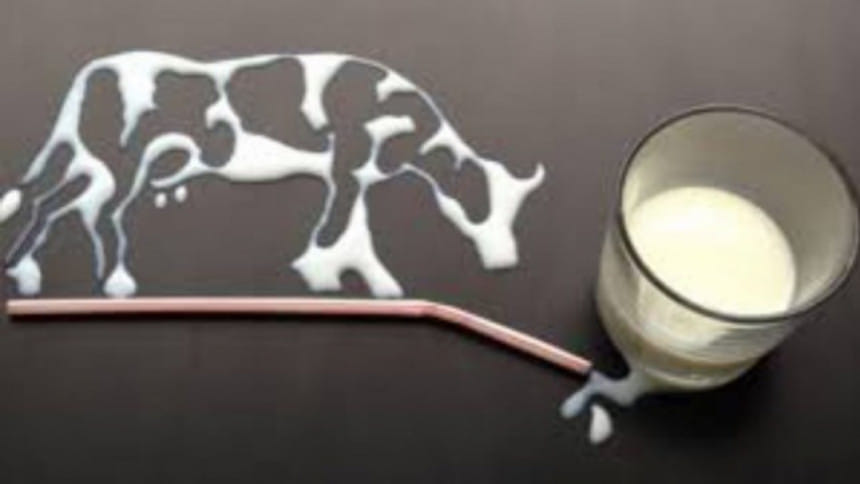Harmful Substances in Milk: Producers in a fix

Milk producers find themselves in a tight spot as the processing companies have slashed purchase due to a slump in demand over health concerns, say farmers and processors.
This follows the release of recent test reports by Bangladesh Food Safety Authority and a team of Dhaka University researchers that found presence of harmful substances such as lead and antibiotics in samples of pasteurised and raw milk.
The findings have dented consumers’ confidence and affected the demand for locally produced milk, say processors.
In the last two to three weeks, the daily sale of four major processors -- Milkvita, Pran, BRAC Dairy and Akij Food -- dropped roughly by 25 percent to 312,000 litres from 420,000 litres earlier, said officials of the firms.
The milk processors have reduced purchase of raw milk, forcing many farmers to sell their produce to local sweet-makers and others at throwaway prices.
Jewel Rahman, a milk producer in Pabna’s Bhangura upazila, is one of them.
He along with his fellow farmers had to sell 90 litres of milk at the local market after the BRAC Dairy’s collection centre in the area refused to buy all of their 500 litres of milk on Wednesday.
“We had to go to the local market and sell the remaining milk to sweet shops for Tk 15-20 a litre. We had to sell it on credit,” said Jewel.
Harunur Rashid, coordinator of Per-Vangura Milk Traders Cooperative Association, said farmers could not sell 10-15 percent of their produce to processors.
“We have no other option but to sell milk like hawkers at the local market at very low prices. We are incurring losses,” said Saiful Islam, who supplies milk to Pran and Milkvita collection centres in Pabna’s Faridpur upazila, one of the biggest dairy zones in the country.
Processors buy milk mainly from the dairy zones in north and north-western districts for Tk 30-55 a litre. Now they are buying less due to falling demand.
“We cannot buy all the milk farmers are bringing to us. What will we do with the surplus milk when sales are falling and demand is decreasing gradually?” asked Md Delwar Hossain, managing director of Bangladesh Milk Producer’s Cooperative Union Ltd, known as Milkvita.
This is the first time the local dairy sector faces a major setback, which could hamper the steady growth of dairy farming in Bangladesh, a milk-deficient country.
It imports more than 125,000 tonnes of milk powder annually to meet household and industrial demand.
The Department of Livestock Services said the total milk production rose by 6 percent year-on-year to 99.23 lakh tonnes in fiscal 2018-19 from 94 lakh tonnes a year ago.
And the rest of the demand is met through imports. From July to April of fiscal 2018-19, 123,710 tonnes of milk powder and dairy products were imported for Tk 2,250 crore, show data of Bangladesh Bank and Bangladesh Bureau of Statistics.
A section of consumers has switched to imported powder milk, raising concern among sector operators that foreign milk may gradually capture the local market.
“The quality of imported powder milk should also be examined…,” said the Milkvita MD.
Milkvita, a state-sponsored cooperative union, said it used to buy and sell every day more than 100,000 litres of pasteurised milk before the DU team’s test results were published on June 25.
Since the results’ publication, demand for pasteurised milk has been in decline, it claimed.
“We sold up to 185,000 litres of milk a day during the month of Ramadan. Now our daily sales have dropped to around 80,000 litres,” Delwar pointed out.
“Panic has been created among people amid media reports on the quality of milk… We cannot buy milk in large quantities because the demand has fallen,” he added.
Mohammad Anisur Rahman, general secretary of National Dairy Development Forum, said, “We along with other processors buy milk from two lakh farmers.
“Consumers are slashing purchase of locally produced milk and switching to imported powder milk… The bulk of the producers are small-scale farmers and they have been affected the most.”
A negative perception has been created among consumers about locally produced milk and dairy products following the publication of test results on milk, said Anisur, also director of Dairy and Food Project of BRAC Social Enterprises.
“We have not added lead to milk… Frankly speaking, we as processors are confused about who to approach and where to test our milk.”
Sales of pasteurised milk processed by BRAC Dairy fell to 67,000 litres a day from 100,000 litres two weeks ago, said Anisur.
Mohammad Imran Hossain, president of Bangladesh Dairy Farmers Association, said the organisation advised its members to make ghee and dairy products instead of selling their produce at low prices.
“We urge the authorities and researchers to collect milk from us, test those and guide us. We want a solution.
“The source of the problem should be identified and the government should think seriously about the dairy sector so that it can flourish.”
Eleash Mridha, managing director of PRAN Group, said the local dairy sector has made big strides in the last 20 years.
The government should engage a team of experts to identify the root cause of the problem. Farmers and collectors should be trained on hygiene, he mentioned.
The government should also monitor the quality of feed for the betterment of local dairy, added Eleash.


 For all latest news, follow The Daily Star's Google News channel.
For all latest news, follow The Daily Star's Google News channel. 



Comments